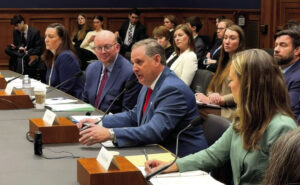School foods getting healthier
Elizabeth Lerch, Tyler Brown, Laken Brown and Olivia Gann enjoy a healthy lunch provided by the summer feeding program at Tharptown schools. | Nathan Strickland/FCT
Slashing sodium intake and pushing fruits and vegetables has been the goal for local school nutritionists for several years and the fight against sugary and fattening food will continue this school year.
Legislation was proposed in February 2010 to ban sugary drinks and other junk foods from schools. But many argue that removing vending machines and fatty foods from schools may do little to impact growing obesity rates among the country’s youth.
Russellville City Schools nutritionist Elaine Vaughn said it’s not necessarily the school system food that contributes to the obesity rates.
“Everybody is so fast paced now a days,” she said “Kids are going to eat what they want to eat and that is just the way it is, but we are doing our best to better educate them about their nutritional choices so they can make better decisions.”
Vaughn said the vending machines have better choices now such as baked chips and 100 percent fruit juices than they did seven years ago, so things have gotten a lot better.
According to the Center for Disease Control, childhood obesity has tripled in the last 30 years.
Mississippi and Alabama rank one and two on the list of childhood obesity rates.
Obesity puts individuals at risk for many health ailments. Increased risk for cardiovascular disease, high cholesterol and high blood pressure are some concerns. Cancer, type 2 diabetes and joint problems are also an increased risk for overweight kids.
Franklin County schools nutritionist Carol Humphres said there are two issues contributing to out obesity rate.
“The lack of exercise and lifestyle changes are what I believe to be the main contributors to our obesity rate,” she said. “Everything now is supersized and there are lots of kids who stay indoors all the time. Its all about portion control and staying active.”
Humphries said nutrition education has helped paved the way for students to except a healthier lifestyle.
A federal push in schools could see an overhaul of school breakfast and lunch programs that would mean additional money spent by school districts that are already tapped for funds.
Vaughn said she has seen interest in breakfast pick up tremendously over the years.
“We have close to 300 students who participate in our breakfast program now. We use to only cater to an average of 50 at one time,” she said. “We have a grab-and-go breakfast that is cheap and gives students energy to begin their school day. I think it is a great program.”
Russellville and three Franklin County schools participated in the summer program to provide that healthy food while students are out of school.
Russellville’s program ends Friday and Franklin County Schools has extended theirs to July 30.
Both Humphres and Vaughn believe their nutritional programs have been well accepted by the students and plan to continue to push for students to choose a healthier lifestyle instead of going to the alternative.







